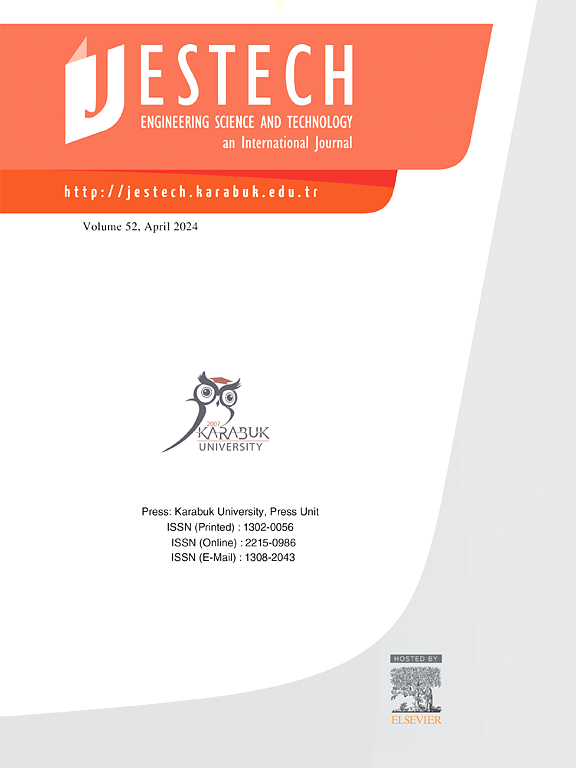Sample selection using multi-task autoencoders in federated learning with non-IID data
IF 5.1
2区 工程技术
Q1 ENGINEERING, MULTIDISCIPLINARY
Engineering Science and Technology-An International Journal-Jestech
Pub Date : 2025-01-01
DOI:10.1016/j.jestch.2024.101920
引用次数: 0
Abstract
Federated learning is a machine learning paradigm in which multiple devices collaboratively train a model under the supervision of a central server while ensuring data privacy. However, its performance is often hindered by redundant, malicious, or abnormal samples, leading to model degradation and inefficiency. To overcome these issues, we propose novel sample selection methods for image classification, employing a multi-task autoencoder to estimate sample contributions through loss and feature analysis. Our approach incorporates unsupervised outlier detection, using one-class support vector machine (OCSVM), isolation forest (IF), and adaptive loss threshold (AT) methods managed by a central server to filter noisy samples on clients. We also propose a multi-class deep support vector data description (SVDD) loss controlled by a central server to enhance feature-based sample selection. We validate our methods on CIFAR10 and MNIST datasets across varying numbers of clients, non-IID distributions, and noise levels up to 40%. The results show significant accuracy improvements with loss-based sample selection, achieving gains of up to 7.02% on CIFAR10 with OCSVM and 1.83% on MNIST with AT. Additionally, our federated SVDD loss further improves feature-based sample selection, yielding accuracy gains of up to 0.99% on CIFAR10 with OCSVM. These results show the effectiveness of our methods in improving model accuracy across various client counts and noise conditions.
求助全文
约1分钟内获得全文
求助全文
来源期刊

Engineering Science and Technology-An International Journal-Jestech
Materials Science-Electronic, Optical and Magnetic Materials
CiteScore
11.20
自引率
3.50%
发文量
153
审稿时长
22 days
期刊介绍:
Engineering Science and Technology, an International Journal (JESTECH) (formerly Technology), a peer-reviewed quarterly engineering journal, publishes both theoretical and experimental high quality papers of permanent interest, not previously published in journals, in the field of engineering and applied science which aims to promote the theory and practice of technology and engineering. In addition to peer-reviewed original research papers, the Editorial Board welcomes original research reports, state-of-the-art reviews and communications in the broadly defined field of engineering science and technology.
The scope of JESTECH includes a wide spectrum of subjects including:
-Electrical/Electronics and Computer Engineering (Biomedical Engineering and Instrumentation; Coding, Cryptography, and Information Protection; Communications, Networks, Mobile Computing and Distributed Systems; Compilers and Operating Systems; Computer Architecture, Parallel Processing, and Dependability; Computer Vision and Robotics; Control Theory; Electromagnetic Waves, Microwave Techniques and Antennas; Embedded Systems; Integrated Circuits, VLSI Design, Testing, and CAD; Microelectromechanical Systems; Microelectronics, and Electronic Devices and Circuits; Power, Energy and Energy Conversion Systems; Signal, Image, and Speech Processing)
-Mechanical and Civil Engineering (Automotive Technologies; Biomechanics; Construction Materials; Design and Manufacturing; Dynamics and Control; Energy Generation, Utilization, Conversion, and Storage; Fluid Mechanics and Hydraulics; Heat and Mass Transfer; Micro-Nano Sciences; Renewable and Sustainable Energy Technologies; Robotics and Mechatronics; Solid Mechanics and Structure; Thermal Sciences)
-Metallurgical and Materials Engineering (Advanced Materials Science; Biomaterials; Ceramic and Inorgnanic Materials; Electronic-Magnetic Materials; Energy and Environment; Materials Characterizastion; Metallurgy; Polymers and Nanocomposites)
 求助内容:
求助内容: 应助结果提醒方式:
应助结果提醒方式:


